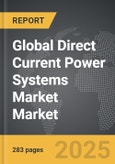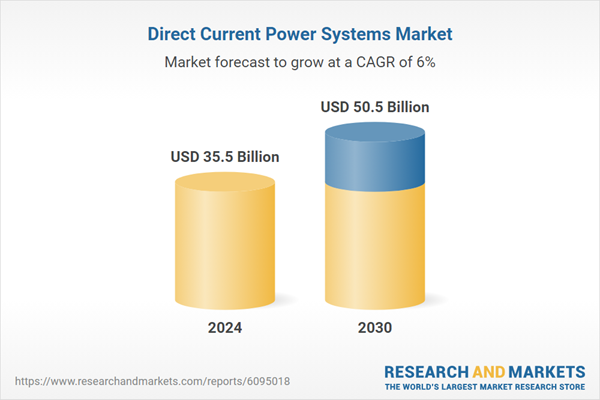Global Direct Current Power Systems Market - Key Trends & Drivers Summarized
Why Are Direct Current (DC) Power Systems Gaining Renewed Relevance Across Critical Infrastructure?
Direct Current (DC) power systems, once overshadowed by Alternating Current (AC) dominance, are making a strong resurgence as industries increasingly seek energy-efficient, stable, and low-loss power delivery solutions. DC systems are now indispensable in telecommunications, data centers, industrial automation, railway electrification, and renewable energy installations. Their ability to offer precise voltage control, reduced conversion loss, and improved energy storage integration makes them ideally suited for mission-critical applications that demand high uptime and performance consistency.Modern DC power systems are engineered to deliver power with minimal disruption, especially where voltage fluctuations or conversion inefficiencies can compromise sensitive electronics. In remote locations, disaster recovery setups, or off-grid areas, DC-based architectures provide highly reliable power management without the complexity of frequent AC-DC-AC transformations. Additionally, as the global transition toward electrification accelerates, DC systems offer a natural match for battery-powered equipment, solar panels, electric vehicle (EV) charging stations, and microgrids.
Which Technologies Are Accelerating the Efficiency and Scalability of DC Power Architectures?
The evolution of high-efficiency power electronics has significantly enhanced the feasibility and flexibility of DC power systems. Innovations in insulated-gate bipolar transistors (IGBTs), gallium nitride (GaN) and silicon carbide (SiC) semiconductors, and intelligent power control modules have improved switching performance, thermal stability, and voltage tolerance. Modular DC rectifiers and digitally controlled power distribution units (PDUs) are enabling smarter power flow regulation, fault detection, and system scalability in real-time.Advanced battery management systems (BMS), integration with renewable energy sources, and DC-optimized uninterruptible power supply (UPS) systems are expanding DC's presence in hybrid power infrastructures. Additionally, energy storage systems such as lithium-ion and flow batteries operate natively on DC, eliminating conversion losses when integrated into a unified power environment. The adoption of smart grid technologies, IoT-based monitoring, and AI-driven load optimization further enhance DC power systems' responsiveness and efficiency.
Which Industries and Applications Are Leading the Demand for DC Power Systems?
The telecommunications sector remains a dominant end-user of DC power systems, particularly for base transceiver stations, data transmission nodes, and broadband infrastructure that require uninterrupted low-voltage supply. The rise of 5G, IoT networks, and edge computing is intensifying demand for scalable and compact DC solutions that support distributed infrastructure. In the IT sector, hyperscale and edge data centers are adopting DC architectures to reduce energy consumption, improve PUE (Power Usage Effectiveness), and streamline backup power systems.In industrial settings, DC systems are supporting factory automation, robotic systems, and motion control applications by providing consistent power to sensors, actuators, and motor drives. Railway systems, metro projects, and electric public transportation are also relying on high-voltage DC to reduce energy transmission losses and enhance regenerative braking. Additionally, in renewable energy installations - particularly solar PV farms and wind turbine systems - DC power forms the backbone of direct integration with storage and smart inverters.
What Is Driving Growth in the Direct Current Power Systems Market?
The growth in the direct current power systems market is driven by several factors, including the increasing deployment of high-density data centers, the rapid expansion of telecom infrastructure, and the shift toward decentralized and renewable energy models. The rising global emphasis on energy efficiency, electrification of mobility, and the need to reduce operational losses in power distribution systems is propelling industries to re-examine and adopt DC-based solutions.End-use trends such as the integration of distributed energy resources (DER), the growth of off-grid electrification projects in developing regions, increased uptake of electric vehicle infrastructure, and advances in DC microgrid design are reinforcing the market trajectory. Furthermore, the push for digitization, predictive maintenance, and intelligent energy management in industrial and utility-scale systems is encouraging broader adoption of smart, modular DC architectures. As energy infrastructures evolve toward high-efficiency, low-carbon operations, direct current power systems are emerging as a key enabler of next-generation power reliability and performance.
Report Scope
The report analyzes the Direct Current Power Systems market, presented in terms of market value (US$). The analysis covers the key segments and geographic regions outlined below:- Segments: System Type (Below 24V DC Power System, 48V DC Power System, Above 48V DC Power System); End-Use (Industrial End-Use, Telecom End-Use, Commercial End-Use, Other End-Uses).
- Geographic Regions/Countries: World; United States; Canada; Japan; China; Europe (France; Germany; Italy; United Kingdom; Spain; Russia; and Rest of Europe); Asia-Pacific (Australia; India; South Korea; and Rest of Asia-Pacific); Latin America (Argentina; Brazil; Mexico; and Rest of Latin America); Middle East (Iran; Israel; Saudi Arabia; United Arab Emirates; and Rest of Middle East); and Africa.
Key Insights:
- Market Growth: Understand the significant growth trajectory of the Below 24V DC Power System segment, which is expected to reach US$25 Billion by 2030 with a CAGR of a 4.7%. The 48V DC Power System segment is also set to grow at 7.7% CAGR over the analysis period.
- Regional Analysis: Gain insights into the U.S. market, valued at $9.7 Billion in 2024, and China, forecasted to grow at an impressive 9.3% CAGR to reach $10.2 Billion by 2030. Discover growth trends in other key regions, including Japan, Canada, Germany, and the Asia-Pacific.
Why You Should Buy This Report:
- Detailed Market Analysis: Access a thorough analysis of the Global Direct Current Power Systems Market, covering all major geographic regions and market segments.
- Competitive Insights: Get an overview of the competitive landscape, including the market presence of major players across different geographies.
- Future Trends and Drivers: Understand the key trends and drivers shaping the future of the Global Direct Current Power Systems Market.
- Actionable Insights: Benefit from actionable insights that can help you identify new revenue opportunities and make strategic business decisions.
Key Questions Answered:
- How is the Global Direct Current Power Systems Market expected to evolve by 2030?
- What are the main drivers and restraints affecting the market?
- Which market segments will grow the most over the forecast period?
- How will market shares for different regions and segments change by 2030?
- Who are the leading players in the market, and what are their prospects?
Report Features:
- Comprehensive Market Data: Independent analysis of annual sales and market forecasts in US$ Million from 2024 to 2030.
- In-Depth Regional Analysis: Detailed insights into key markets, including the U.S., China, Japan, Canada, Europe, Asia-Pacific, Latin America, Middle East, and Africa.
- Company Profiles: Coverage of players such as Agrofert Holding, a.s., Atul Ltd., BASF SE, Chemtura Corporation (now part of LANXESS), Duslo a.s. and more.
- Complimentary Updates: Receive free report updates for one year to keep you informed of the latest market developments.
Some of the 43 companies featured in this Direct Current Power Systems market report include:
- ABB Ltd.
- Advanced Energy Industries Inc.
- AEG Power Solutions BV
- C&D Technologies Inc.
- Delta Electronics Inc.
- Eaton Corporation Plc
- Emerson Electric Co.
- EnerSys
- GE Vernova
- Hitachi Energy
- Huawei Technologies Co. Ltd.
- Infineon Technologies AG
- Johnson Electric Holdings Ltd.
- Lite-On Technology Corp.
- MEAN WELL Enterprises Co. Ltd.
- Mitsubishi Electric Corp.
- Schneider Electric
- Siemens AG
- Vertiv Holdings Co.
- Vicor Corporation
This edition integrates the latest global trade and economic shifts into comprehensive market analysis. Key updates include:
- Tariff and Trade Impact: Insights into global tariff negotiations across 180+ countries, with analysis of supply chain turbulence, sourcing disruptions, and geographic realignment. Special focus on 2025 as a pivotal year for trade tensions, including updated perspectives on the Trump-era tariffs.
- Adjusted Forecasts and Analytics: Revised global and regional market forecasts through 2030, incorporating tariff effects, economic uncertainty, and structural changes in globalization. Includes historical analysis from 2015 to 2023.
- Strategic Market Dynamics: Evaluation of revised market prospects, regional outlooks, and key economic indicators such as population and urbanization trends.
- Innovation & Technology Trends: Latest developments in product and process innovation, emerging technologies, and key industry drivers shaping the competitive landscape.
- Competitive Intelligence: Updated global market share estimates for 2025, competitive positioning of major players (Strong/Active/Niche/Trivial), and refined focus on leading global brands and core players.
- Expert Insight & Commentary: Strategic analysis from economists, trade experts, and domain specialists to contextualize market shifts and identify emerging opportunities.
Table of Contents
Companies Mentioned (Partial List)
A selection of companies mentioned in this report includes, but is not limited to:
- ABB Ltd.
- Advanced Energy Industries Inc.
- AEG Power Solutions BV
- C&D Technologies Inc.
- Delta Electronics Inc.
- Eaton Corporation Plc
- Emerson Electric Co.
- EnerSys
- GE Vernova
- Hitachi Energy
- Huawei Technologies Co. Ltd.
- Infineon Technologies AG
- Johnson Electric Holdings Ltd.
- Lite-On Technology Corp.
- MEAN WELL Enterprises Co. Ltd.
- Mitsubishi Electric Corp.
- Schneider Electric
- Siemens AG
- Vertiv Holdings Co.
- Vicor Corporation
Table Information
| Report Attribute | Details |
|---|---|
| No. of Pages | 283 |
| Published | January 2026 |
| Forecast Period | 2024 - 2030 |
| Estimated Market Value ( USD | $ 35.5 Billion |
| Forecasted Market Value ( USD | $ 50.5 Billion |
| Compound Annual Growth Rate | 6.0% |
| Regions Covered | Global |









